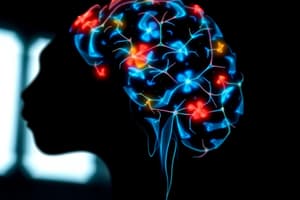Podcast
Questions and Answers
What does the behaviourist theory of learning primarily emphasize?
What does the behaviourist theory of learning primarily emphasize?
- The significance of innate biological factors in behavior development
- The importance of social interactions in learning processes
- The role of internal thoughts in understanding learning
- The modification of observable behaviors through environmental stimuli (correct)
According to B.F. Skinner, which of the following best describes learning?
According to B.F. Skinner, which of the following best describes learning?
- A lasting change in behavior triggered by external events (correct)
- A permanent change in behavior resulting from cognitive restructuring
- A culmination of personal experience and introspection
- A process influenced solely by genetic predispositions
Which assumption of behaviorism highlights the importance of external factors over individual learner characteristics?
Which assumption of behaviorism highlights the importance of external factors over individual learner characteristics?
- Observable behavior
- Contiguity principles
- Innate behaviorism
- Environmental influence (correct)
What does the contiguity principle in behaviourism suggest about learning?
What does the contiguity principle in behaviourism suggest about learning?
What likely happens to behaviors that are positively reinforced according to behaviourist principles?
What likely happens to behaviors that are positively reinforced according to behaviourist principles?
What is behaviourism?
What is behaviourism?
Who is considered to be the key to understanding learning?
Who is considered to be the key to understanding learning?
How did the behaviourists use experimental procedures to study learning?
How did the behaviourists use experimental procedures to study learning?
According to the behaviourist theory, the environment provides stimuli to which individuals develop responses.
According to the behaviourist theory, the environment provides stimuli to which individuals develop responses.
Who was one of the foremost behaviourists to expand on the works of John Watson?
Who was one of the foremost behaviourists to expand on the works of John Watson?
Skinner believed that learning is a change of behaviour resulting from external events.
Skinner believed that learning is a change of behaviour resulting from external events.
Skinner believed that learning occurs when unconscious stimuli triggers an action.
Skinner believed that learning occurs when unconscious stimuli triggers an action.
What is an example of a repeated action that is likely to be rewarded?
What is an example of a repeated action that is likely to be rewarded?
There are three assumptions that underpin the behaviourist theory of learning.
There are three assumptions that underpin the behaviourist theory of learning.
Learning is an internal thought process.
Learning is an internal thought process.
The environment shapes one's behaviour.
The environment shapes one's behaviour.
Learning is determined by internal thoughts and not by external factors.
Learning is determined by internal thoughts and not by external factors.
The contiguity principle states that how close in time two events must be for a bond to be formed.
The contiguity principle states that how close in time two events must be for a bond to be formed.
Reinforcement is any consequence that increases the probability of the behaviour producing that consequence.
Reinforcement is any consequence that increases the probability of the behaviour producing that consequence.
Flashcards
Behaviourism
Behaviourism
A psychological approach focusing on observable behaviours and how they change through environmental interactions.
Observable behavior
Observable behavior
The measurable changes in actions or responses, viewed externally by others.
Environmental influence (in learning)
Environmental influence (in learning)
The environment dictates what behaviour is learned, rather than internal thought.
Contiguity Principle
Contiguity Principle
Signup and view all the flashcards
Reinforcement
Reinforcement
Signup and view all the flashcards
Classical Conditioning
Classical Conditioning
Signup and view all the flashcards
Operant Conditioning
Operant Conditioning
Signup and view all the flashcards
Instrumental Conditioning
Instrumental Conditioning
Signup and view all the flashcards
Positive Reinforcement
Positive Reinforcement
Signup and view all the flashcards
Punishment
Punishment
Signup and view all the flashcards
Activity (Learning by Doing)
Activity (Learning by Doing)
Signup and view all the flashcards
Repetition
Repetition
Signup and view all the flashcards
Generalization
Generalization
Signup and view all the flashcards
Discrimination
Discrimination
Signup and view all the flashcards
Thorndike's S-R Theory
Thorndike's S-R Theory
Signup and view all the flashcards
Hartley's Four Stages
Hartley's Four Stages
Signup and view all the flashcards
Variable Contexts
Variable Contexts
Signup and view all the flashcards
Practice Makes Perfect
Practice Makes Perfect
Signup and view all the flashcards
Skills Acquisition
Skills Acquisition
Signup and view all the flashcards
What is the difference between classical and operant conditioning?
What is the difference between classical and operant conditioning?
Signup and view all the flashcards
How does positive reinforcement work?
How does positive reinforcement work?
Signup and view all the flashcards
Why is punishment less effective than positive reinforcement?
Why is punishment less effective than positive reinforcement?
Signup and view all the flashcards
What is the role of repetition in learning?
What is the role of repetition in learning?
Signup and view all the flashcards
Why is it essential to practice in diverse contexts?
Why is it essential to practice in diverse contexts?
Signup and view all the flashcards
How does Thorndike's S-R theory explain learning?
How does Thorndike's S-R theory explain learning?
Signup and view all the flashcards
Study Notes
Behaviourist Theory of Learning
- Behaviourism is a field of psychology focusing on individual behaviour.
- It stems from the early work of John B. Watson (1913, 1925).
- Watson believed understanding learning could be found through behaviour analysis.
- Behaviourists use experimental procedures to modify behaviours observable.
- Learning is observable, influenced by stimuli, and conditioned through environmental changes.
- Individuals respond to stimuli presented by the environment.
- Burrhus Frederic Skinner (1953, 1963) expanded on Watson's work.
- Skinner believed learning was an enduring change in behaviour from external stimuli (conscious or unconscious).
- Actions rewarded are more likely to be repeated (learned).
- Three critical behaviourist assumptions are:
i. Observable Behaviour
- Learning is demonstrated by observable behaviour changes, rather than internal thought processes.
ii. Environment's Influence
- Learning is determined by environmental elements, independent of the individual.
iii. Contiguity and Reinforcement
- Learning develops from the closeness in time between events (contiguity) and reinforcement.
Studying That Suits You
Use AI to generate personalized quizzes and flashcards to suit your learning preferences.




